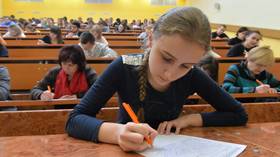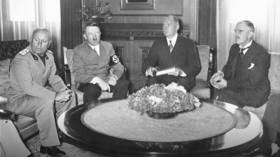Eternal Post-Soviet language wars rage on: Latvian MP wants more usage of 'hated Russian' but ex-Belarusian leader demands less

If you spend some time in the post-Soviet space, you'll immediately come to understand that there's almost nothing as ridiculous as its frequent 'language wars.' Which generally involve use of Russian or a lesser spoken tongue.
Now, the former leader of Belarus - where Russian is the de-facto everyday tool of communication - has proposed removing Russian as one of the official state languages, leaving only Belarusian. Meanwhile, in Latvia - where the native lingo is commonly used - an MP has urged the country to be more willing to use “the hated Russian language.”
“The state language should be one language – Belarusian, because it no longer has a homeland,” explained Stanislav Shushkevich, who served as the chairman of the Supreme Council of Belarus from 1991 to 1994 and was subsequently the country's first head of state, following independence.
Shushkevich noted that, although there had never been any ethnic issues between Russian and Belarusian people, the native language needs to be protected. In a 1995 referendum, a proposal to give the Russian language equal status to Belarusian was passed with 83.3 percent of the vote.
In Latvia, one politician is turning towards Russian. Jānis Urbanovičs, the leader of the country's left-wing ‘Harmony’ party, has encouraged his country to use the “hated” Russian language during negotiations with Moscow. Riga is currently suffering badly from a lack of cargo traffic, and he wants to solve the issue with help from the Russian neighbors.
“[The ruling coalition] must ensure that the goods go to us, and not to our competitors in Klaipeda, Tallinn, and St. Petersburg,” he wrote. Klaipeda, Tallinn, and St Petersburg are the Baltic Sea ports of neighboring countries Lithuania, Estonia, and Russia, respectively.
“For this to happen, you need to establish contact and negotiations (yes, including in the hated Russian language!)” he said.
Latvia's relationship with Russia and the Russian language is a constant within the country's political landscape. According to the country's 2011 census, 37.2 percent of Latvians use Russian as their primary language at home. However, in a 2012 referendum, only 24.88 percent of voters wanted Russian to officially become a second national language. The issue has remained at the forefront of Latvian politics ever since. It came to a head again in 2018, when President Raimonds Vējonis chose to ban state education institutions teaching classes in the country's most spoken minority tongue. Following the reform, only specific language, literature, or history courses may be conducted in Russian.
Also on rt.com Russian-speaking minority in Latvia protests against new legislative attack on their identityIf you like this story, share it with a friend!
















